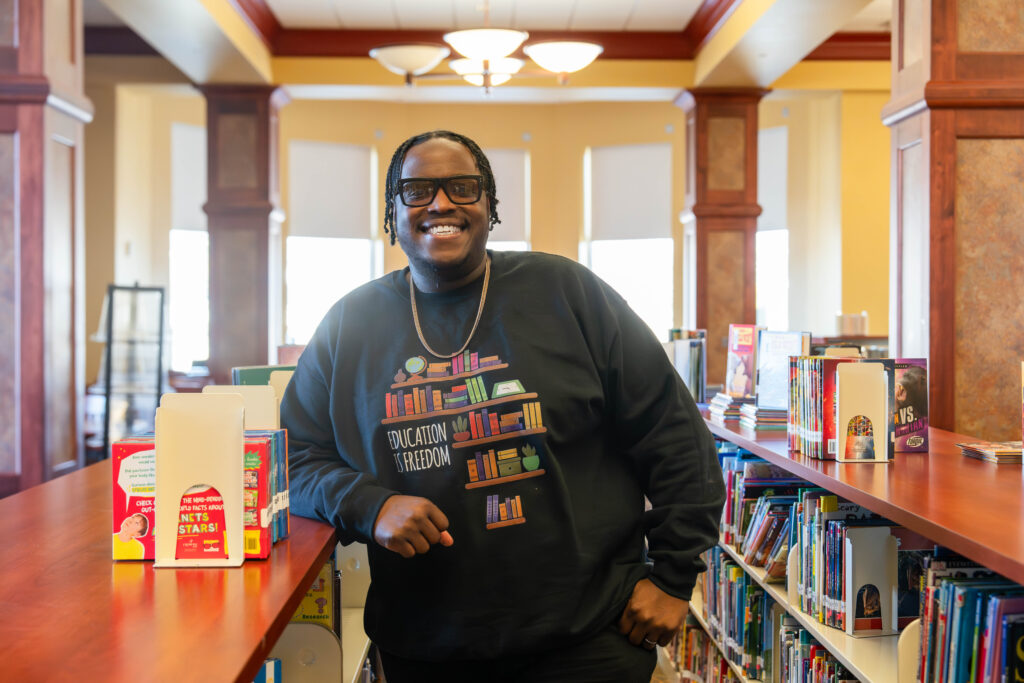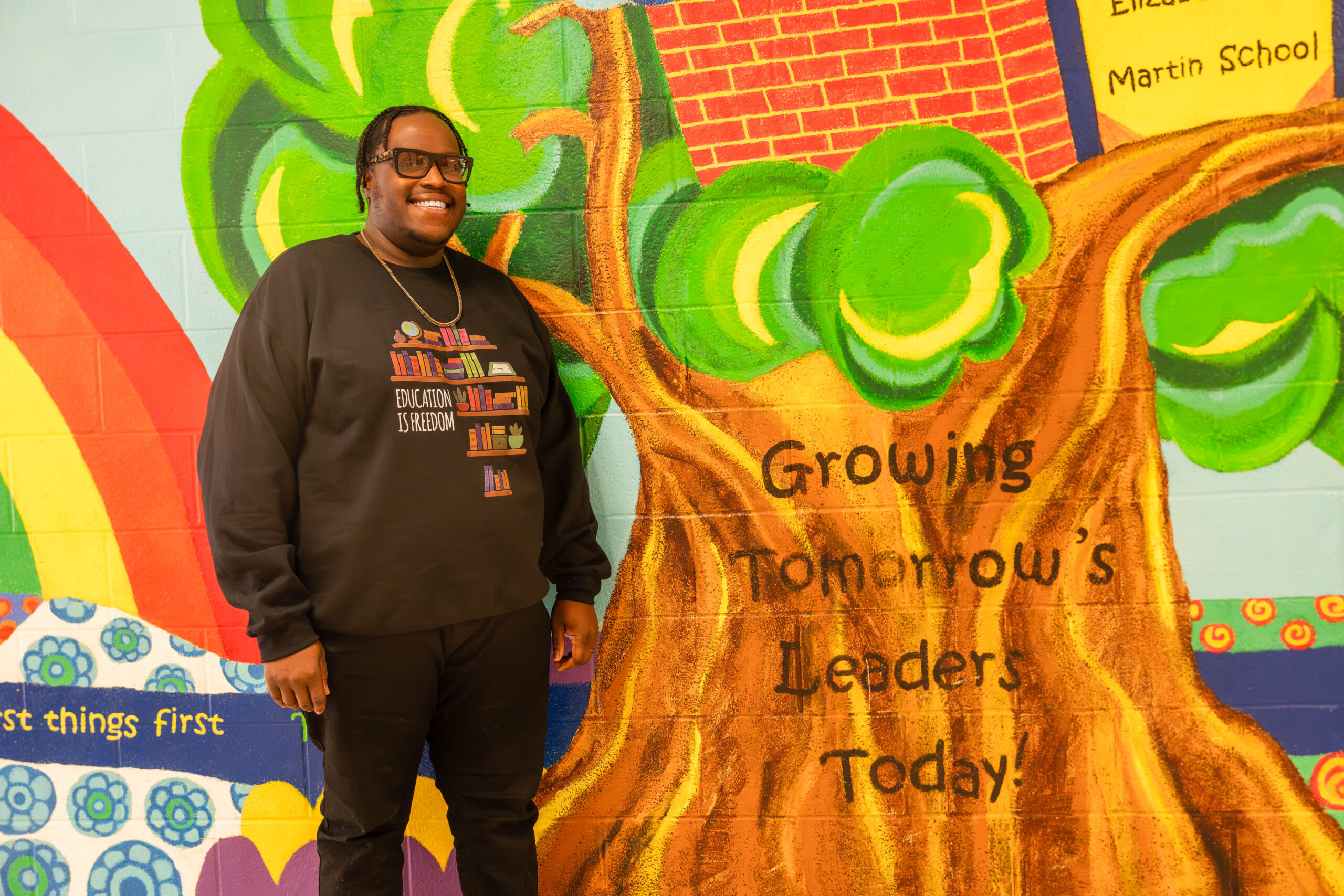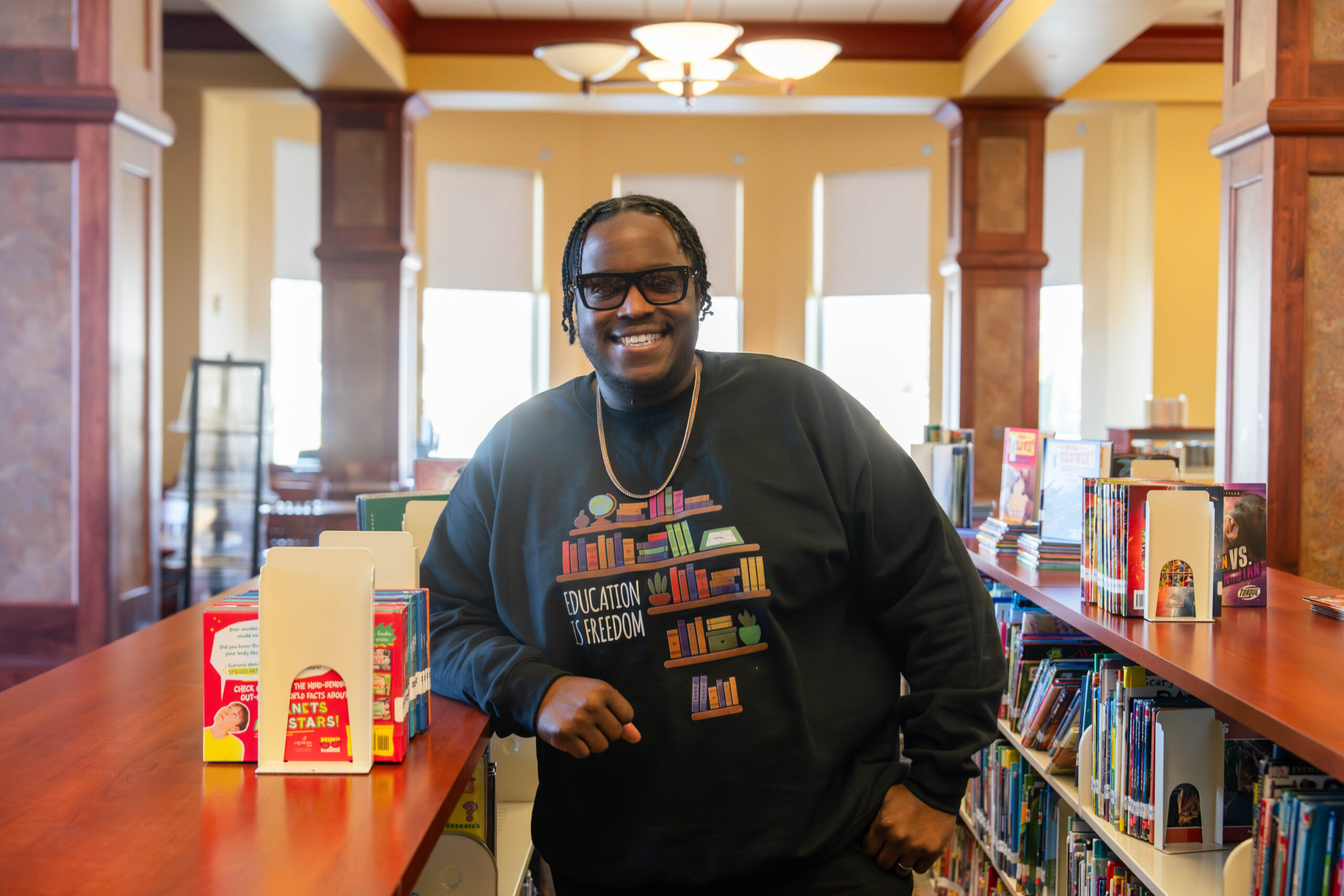
Black History Month is about more than remembering names, it’s about recognizing stories. It’s about those who have paved the way, and those who are walking that path today, creating change in real-time.
Some Black history is written in textbooks. Some are written in classrooms, in church pews, in community board meetings, in the quiet moments where a student looks up and sees someone who truly believes in them.
For Jamar Johnson, a paraprofessional in autistic support at Martin School, a youth pastor, a community advocate and an active leader in the African American Cultural Alliance, Jamar is committed to building stronger, more inclusive systems for young people
Black History is a reminder that leadership is not about where you start: it’s about where you’re willing to go to make a difference. His story is about showing up where it matters most, understanding the needs of students firsthand, and preparing to take on a leadership role that will allow him to create lasting change in education.
But his journey wasn’t always about teaching. He started somewhere very different.
A Career Shift Rooted in Purpose
For more than a decade, Jamar worked in the student loan industry, helping people navigate the complicated world of education finance. He saw firsthand the challenges that many individuals—especially those from underserved communities—faced when trying to access higher education. He spent 14 years in the field, eventually rising to leadership as a union president, where he spent five years negotiating contracts, advocating for fair treatment, and ensuring that workers had a voice.
He was deeply involved in policy work— learning how systems work and how to push for meaningful change within them, advocating for the people around him, and ensuring they had access to the resources and protections they deserved.
Despite his success, he felt a deep pull toward something more impactful.
He started thinking about the root of the issue. Instead of helping people manage student loan debt after they had already struggled through an unequal education system, what if he could be there at the start? What if he could work with students early on—before they faced the financial burdens of college, before they had to navigate adulthood without the right support systems?
That question led him to a life-changing decision.
He knew it wouldn’t be an easy transition. He was leaving behind a stable career, a leadership position, and years of experience in a field where he was respected and successful.
But he also knew that change doesn’t happen by watching from the outside.
He stepped away from his corporate job and stepped into the classroom—this time, not as a financial advisor, but as a paraprofessional working directly with students with autism.

Stepping Into the Classroom: A Commitment to Special Education
His intentional decision to work in autistic support was rooted in a broader vision: one day, he hopes to become a principal, and he wants to ensure that students with disabilities are fully included in the educational experience. He knew that special education, particularly autistic support, often operates in the margins, with teachers and students facing unique challenges that require extra resources and attention.
He had seen how special education programs often receive fewer resources and less visibility in schools. He knew that autistic students and their teachers frequently struggle with feeling isolated from the rest of the school community.
Rather than assuming he understood their experiences, he decided to immerse himself in the work.
“If I ever become a principal, I want to understand firsthand how to better support autistic support classrooms,” he said. “I don’t want these students and their teachers to feel separate from the rest of the school—I want true inclusion. And the best way to do that is by experiencing it firsthand.”
He quickly realized that the greatest challenges weren’t just academic. Many of his students struggled with communication, social interactions, and behavioral expectations that weren’t designed with their needs in mind.
But he also saw something else: the power of consistency and connection.
“When I miss a day, the teachers tell me the kids point at my picture asking, Where’s Mr. Johnson?” he said. “That means something. That means they trust me, that they feel safe with me, that they know I care.”
His work isn’t just about supporting teachers—it’s about building relationships with students, earning their trust, and making sure they feel seen.
For Jamar, this is not just a job. It’s a calling.
By immersing himself in the classroom, Jamar is preparing for the future not just as an educator, but as a leader who understands every layer of what it takes to create an equitable learning environment.
A Calling That Extends Beyond the Classroom
Jamar’s dedication to young people does not stop at the school doors. His passion for mentorship and service extends deeply into the community. As a youth pastor at First Calvary Church of God In Christ in Coatesville, he has committed himself to guiding and uplifting young people, helping them find purpose and confidence in themselves.
“Being around young people comes naturally to me. Whether in the classroom or in ministry, my goal is always to make a difference in at least one child’s life,” he said. “If I can do that, I know I’m doing what I was meant to do.”
His leadership reaches even further. Jamar serves on the United Way of the Capital Region Board of Directors, advocating for community programs that address education, financial stability, and health. Additionally, he is a member of the Lancaster Theological Seminary African American Advisory Council, where he helps ensure that the voices and experiences of Black individuals remain at the forefront of theological education and leadership development. He also works after school at The Mix where he believes that he can learn as much from the youth and families he serves as they can learn from him and the other workers there.
One of Jamar’s most meaningful accomplishments this year has been the launch of “Gentleman in the Making (G.I.M.),” a mentorship program at Martin School In Fall 2024, Jamar took the initiative to create a space for young men to be heard, understood, and guided toward becoming the best versions of themselves.
Each week, he spends time with 30 young men from 5th to 8th grade, leading conversations on:
- Emotional intelligence – helping them navigate their feelings in a healthy way.
- Conflict resolution – teaching them how to handle disagreements with respect.
- Self-discipline and responsibility – encouraging them to take ownership of their actions.
- Personal presentation and etiquette – preparing them to show up confidently in all aspects of life.
More than just a leadership program, G.I.M. is a brotherhood. It is a safe space where these young men can express themselves openly, seek advice on challenges they are facing, and support one another.
At the beginning and end of every session, the boys repeat their motto, a statement that reinforces their values and aspirations:
Being a male is a matter of BIRTH
Being a man is a matter of AGE
But being a gentleman is a matter of CHOICE
He is helping to create a generation of young men who are prepared to lead with confidence and character.
These roles allow him to advocate for young people beyond the walls of the school system. “I don’t just want to help one school—I want to help build stronger systems,” he said.
A Bright Future in Education
Jamar’s impact is already felt within SDoL, but his journey is just beginning. This fall, he will take the next step toward his dream of becoming a teacher by enrolling at Millersville University through the district’s Para to Teacher program. This initiative, fully funded by SDoL, allows paraprofessionals to earn their teaching degrees while continuing to work in the classroom.
“Thank God for SDoL and the Para to Teacher program,” Jamar said. “It’s allowing me to complete my degree and transition into a full-time teaching role. That’s the dream, and this district is making it possible.”
For Jamar, this is more than just career advancement, it’s about gaining the knowledge and experience needed to become a leader who truly understands what teachers and students need.
“It’s one thing to sit in an office and make decisions,” he said. “It’s another thing to have actually been in the classroom, to have worked through the challenges yourself. That’s the kind of principal I want to be—someone who understands because they’ve lived it.”
His long-term goal? To become a principal, leading with the same heart, passion, and hands-on experience that he brings to his role today. He believes that his time in autistic support, his work in ministry, and his commitment to community leadership will all serve him well as he moves forward in his career.

Making History in Real Time
Black History Month is about honoring those who came before us, but it is also about recognizing those who are making history now.
Jamar Johnson is doing that every day.
- He is making schools better for students with autism.
- He is mentoring young people through faith and leadership.
- He is advocating for communities that have been overlooked.
His work is not about recognition. It’s about the students who feel seen because he’s in the room.
Black history isn’t just written by famous figures. It is being written by people like Jamar, who step forward, who commit themselves to something bigger than themselves, and who create change every single day.
To Jamar, and to all the Black educators, mentors, and leaders who pour into our students every single day—thank you.
Your work does not go unnoticed.
You are shaping minds.
You are guiding futures.
You are making history.
